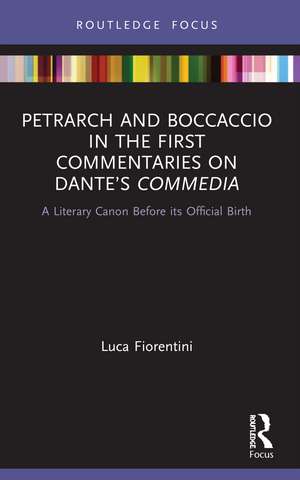Petrarch and Boccaccio in the First Commentaries on Dante’s Commedia: A Literary Canon Before its Official Birth: Young Feltrinelli Prize in the Moral Sciences
Autor Luca Fiorentinien Limba Engleză Paperback – 13 dec 2021
Examining the first commentaries on Dante’s Commedia, the book argues that the elaboration of the canon of the Tre Corone does not date back to the 15th century but instead to the last quarter of the 14th century. The investigation moves from Guglielmo Maramauro’s commentary – circa 1373, and the first exegetical text in which we can find explicit quotations from Petrarch and Boccaccio – to the major commentators of the second half of the 14th century: Benvenuto da Imola, Francesco da Buti and the Anonimo Fiorentino. The work focuses on the conceptual and poetic continuity between Dante, Petrarch, and Boccaccio as identified by the first interpreters of the Commedia, demonstrating that contemporary readers and intellectuals immediately recognized a strong affinity between these three authors based on criteria not merely linguistic or rhetorical.
The findings and conclusions of this work are of great interest to scholars of Dante, as well as those studying medieval poetry and Italian literature.
| Toate formatele și edițiile | Preț | Express |
|---|---|---|
| Paperback (1) | 185.61 lei 6-8 săpt. | |
| Taylor & Francis – 13 dec 2021 | 185.61 lei 6-8 săpt. | |
| Hardback (1) | 462.43 lei 6-8 săpt. | |
| Taylor & Francis – 18 mai 2020 | 462.43 lei 6-8 săpt. |
Preț: 185.61 lei
Nou
Puncte Express: 278
Preț estimativ în valută:
35.52€ • 38.57$ • 29.84£
35.52€ • 38.57$ • 29.84£
Carte tipărită la comandă
Livrare economică 23 aprilie-07 mai
Preluare comenzi: 021 569.72.76
Specificații
ISBN-13: 9780367497606
ISBN-10: 0367497603
Pagini: 120
Dimensiuni: 138 x 216 x 7 mm
Greutate: 0.15 kg
Ediția:1
Editura: Taylor & Francis
Colecția Routledge
Seria Young Feltrinelli Prize in the Moral Sciences
Locul publicării:Oxford, United Kingdom
ISBN-10: 0367497603
Pagini: 120
Dimensiuni: 138 x 216 x 7 mm
Greutate: 0.15 kg
Ediția:1
Editura: Taylor & Francis
Colecția Routledge
Seria Young Feltrinelli Prize in the Moral Sciences
Locul publicării:Oxford, United Kingdom
Public țintă
PostgraduateCuprins
(0) Prologue (1) Chapter I – Poetry, Language, Allegory: Dante in the Hands of Petrarch and Boccaccio (2) Chapter II – Interpreting Dante in the Shadow of Petrarch and Boccaccio (3) Chapter III – Against Petrarch, Theoretician of Poetry: Benvenuto da Imola (4) Chapter IV – Contempt for the Present: The Revenge of Petrarch the Moralist and Historian (5) Epilogue
Notă biografică
Luca Fiorentini is Research Assistant at the University of Rome ‘La Sapienza’, Italy.
Recenzii
"In a hundred or so pages, Fiorentini develops a close comparison with well-known texts, to which, however, he turns with a new question and the resolute will to find an answer." - Lucio Biasiori, Alias Domenica-il manifesto
"In a short and engaging book, Luca Fiorentini rewrites the complex debate about Dante’s Commedia promoted by its very first readers." - Giuliano Milani, Internazionale
"Fiorentini’s essay overcomes what the author himself promises in the introduction of the book, providing the readers with a survey in which the didactic aims are combined with the will of elaborating reflections addressed also to scholars in Italian Studies." - Sara Ferrilli, Linguistica e Letteratura
"In a short and engaging book, Luca Fiorentini rewrites the complex debate about Dante’s Commedia promoted by its very first readers." - Giuliano Milani, Internazionale
"Fiorentini’s essay overcomes what the author himself promises in the introduction of the book, providing the readers with a survey in which the didactic aims are combined with the will of elaborating reflections addressed also to scholars in Italian Studies." - Sara Ferrilli, Linguistica e Letteratura
Descriere
This text proposes a reinterpretation of the history behind the canon of the Tre Corone (Three Crowns), which consists of the three great Italian authors of the 14th century – Dante, Petrarch, and Boccaccio. The conclusions of this work are of interest to scholars of Dante in particular.








